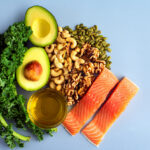Mediterranean makeover: Enhance your vascular health with a high-polyphenol approach
 (NaturalHealth365) In the complex network of the human body, blood vessels serve as vital lifelines, carrying the essence of life itself – blood. Despite occasional nods to cold weather’s impact on vascular health, the mainstream media often overlooks the importance of these indispensable conduits.
(NaturalHealth365) In the complex network of the human body, blood vessels serve as vital lifelines, carrying the essence of life itself – blood. Despite occasional nods to cold weather’s impact on vascular health, the mainstream media often overlooks the importance of these indispensable conduits.
However, research from Negev Ben-Gurion University in Israel has unveiled a compelling revelation: aortic stiffness emerges as a telltale sign of vascular aging. The study’s insights, featured in the Journal of the American College of Cardiology (JACC), shed new light on the intricacies of our circulatory system.
Navigating the circulatory maze: Aortic stiffness and its role in vascular aging
Aortic rigidity emerges as a crucial metric, reflecting the flexibility of blood vessel perimeters. This phenomenon occurs when the elastic fibers within arterial walls undergo wear and tear due to mechanical stress, leading to stiffness.
The research conducted by the team at Negev Ben-Gurion University has now conclusively linked this aortic rigidity to an elevated risk of cardiovascular complications, underscoring the pivotal role it plays in determining vascular health.
Polyphenols in the Mediterranean diet offer a significant boost to vascular health
Israeli scientists pitted the traditional Mediterranean diet against a green, polyphenol-enriched variant and a control diet for analytical purposes. The findings were nothing short of astonishing: the green iteration of the widely-praised Mediterranean diet exhibited twice the effectiveness in preventing blood vessel rigidity.
The modified Mediterranean diet employed in the study featured reduced processed and red meat intake, supplemented by daily consumption of 3-4 cups of green tea, 28 grams of walnuts, and a daily duckweed shake over an 18-month period. Strikingly, this “green” version proved to be a game-changer, contributing to a remarkable 15% reduction in blood vessel rigidity. In stark contrast, the conventional Mediterranean diet led to a 7.3% decrease, while a regular healthy diet demonstrated a modest 4.8% reduction.
The pivotal insight gleaned from this study is that embracing a green Mediterranean diet enriched with dietary polyphenols holds the key to enhancing human health. Polyphenols, found in vegetables, fruits, green tea, and grapes, are compounds that form when acid and glucose unite, marking a promising avenue for promoting overall well-being.
Boost your vascular health with these tasty additions inspired by the Mediterranean diet
Let’s take a closer look at the heart-healthy choices within the traditional Mediterranean diet – a culinary tradition that incorporates black, green, and kalamata olives, a variety of colorful vegetables, a medley of fresh fruits, and the wholesome goodness of wild caught fish.
Now, let’s explore the vibrant world of the green Mediterranean diet, a delightful approach to not only tantalize your taste buds but also to promote better health. This variation introduces a delicious lineup featuring green tea, walnuts, Mankai, broccoli, almonds, and red onion. The star of the show, Mankai duckweed, is an aquatic plant loaded with essential nutrients like polyphenols, vitamin B12, iron, and protein. Easily incorporated into shakes and smoothies, Mankai adds a nutritional punch to your daily routine.
While the local grocery store might not stock Mankai or similar exotic finds, the convenience of online shopping opens doors to a world of nutritional treasures. By easily ordering this nutritional powerhouse online, you can seamlessly integrate it into your wellness journey, taking a delicious step towards a healthier lifestyle.
Sources for this article include:



